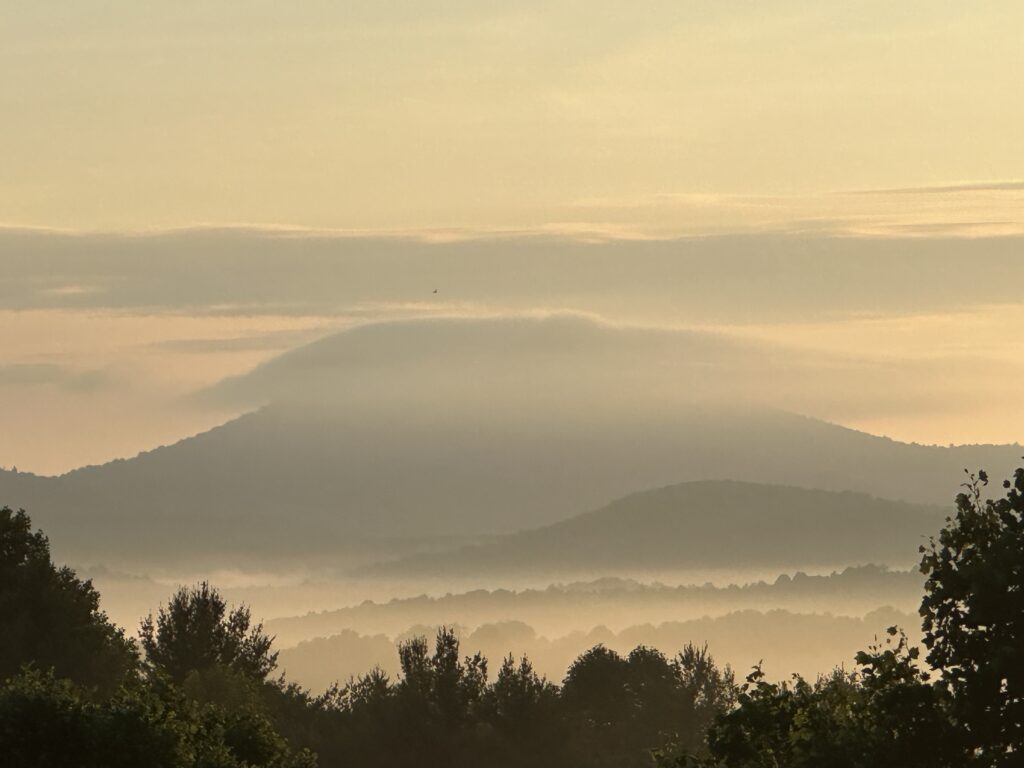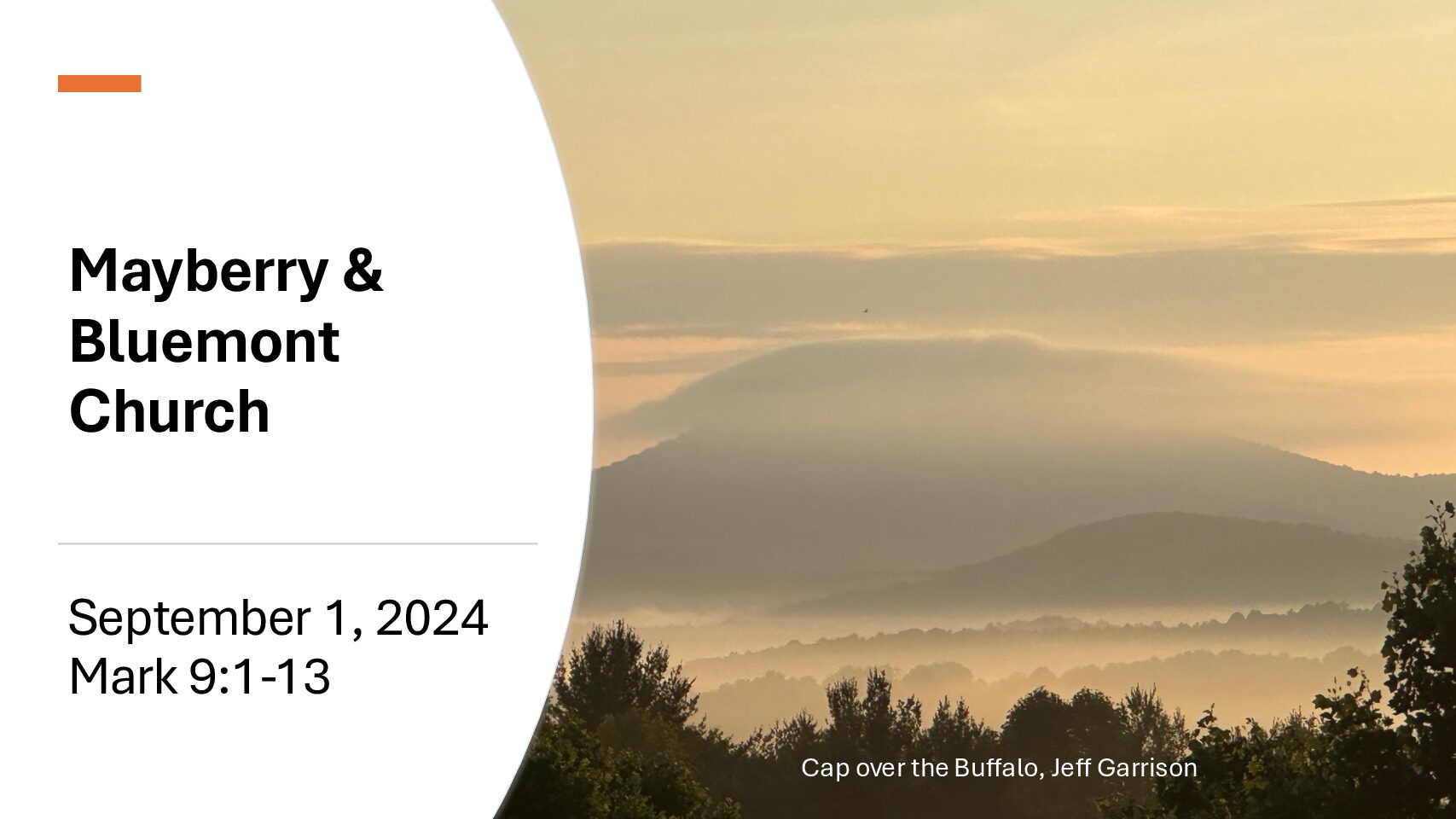Jeff Garrison
Mayberry & Bluemont Churches
September 1, 2024
Mark 9:1-13
At the beginning of worship
About the time I was baptized at Culdee Presbyterian Church on Easter Sunday 1957, a man named Thomas Scott Cadden in Stokie, Illinois crafted the theme song for Mr. Clean. The next year, the song appeared in a commercial with a beefy baldheaded man in a white t-shirt and a golden earring. Proctor and Gamble discovered a winning combination. Was Mr. Clean a sailor? Or a genie? One could make a case for both, but whatever his background, he was known for wiping away grime and making things dazzle.
Mr. Clean gets rid of dirt and grime and grease in just a minute!
Mr. Clean will clean your whole house and everything that’s in it!
Floors, doors, walls, halls, white sidewall tires, and old golf balls!
Sinks, stoves, bathtubs he’ll do, he’ll even help clean laundry too![1]
Most of us have depended on Mr. Clean products during our lifetime, but if you really want to dazzle, baptism is the way to go. Only Jesus can really clean away the grease and grime of sin. In today’s passage, like three of the disciples, we’ll get a glimpse of the glory that comes from being made dazzling clean.
Before reading the Scripture
I’m preaching on the Transfiguration today. When I have preached on the transfiguration in the past, it was because I was following the lectionary. This passage appears with minor differences in all three of the synoptic gospels. And it always comes up in the lectionary just before Lent. In the past, I had to force myself to preach on the passage. I’ve wondered what the big deal was about it.
But by working through Mark’s gospel, chapter by chapter, verse by verse, I find the passage to be more compelling. When it comes up in the lectionary, the passage sits out by itself.[2] But by working through the gospel, we get to see it in context. Last week, we heard Peter profess Jesus to be the Messiah. Afterwards, Jesus begins to focus on heading to Jerusalem where he will be executed. The disciples, thinking as any human, don’t like this idea. What good is a dead Messiah? Besides, as we’ll see today, they have no frame of reference to understand Jesus’ resurrection.
In today’s text, after a phrase that just seems to hang out there in verse 1, Jesus provides three of the disciples a glimpse of his glory. Of course, they are not to share this experience until after Jesus’ resurrection.
There’s a lot of unanswered questions in this text. How did the disciples know it was Moses and Elijah with Jesus? And what does their presence mean? Let’s see if we might find out.
Jesus, in the first chapter of the gospel of Mark, proclaims the kingdom of God has come near.[3] Jesus in verse 1 of today’s text speaks about those not dying until the kingdom of God come with power. This confusing verse has created lots of debate. Some, interpreting it to mean the kingdom coming at the end of the age, wonder if Jesus didn’t get it right. After all, everyone alive in roughly 30 AM have long been dead.
I think Jesus refers to his resurrection, not to the end of history. And many, actually most, of those who followed Jesus would still be alive for his resurrection.[4] This also fits into the upcoming story of the transfiguration. In fact, this sentence in all three gospel accounts precede the transfiguration.[5] Knowing this, we can understand the Transfiguration as a foretaste of the kingdom for those disciples closest to Jesus.
The disciples are privy with the knowledge that Jesus is more than just a miracle worker traveling around doing good. Jesus comes with divine purposes that the disciples don’t fully understand. They don’t even seem to understand what happened on the mountain that day, but at least they know there is something special about Jesus.
This passage follows a similar trajectory to the story of Moses on the mountain in Exodus 24. In both, there is a wait of six days. Mark doesn’t put much emphasize on numbers,[6] but for some reason mentions six days passing between their time in Caesarea Philip and their climb up the mountain. These days makes it harder to pinpoint which mountain they were on.
Traditionally, Mount Tabor is considered the mountain of transfiguration, but it’s not a high mountain and it was inhabited in the first century. So, it wasn’t a place where they could be by themselves. But they could have walked there within a few days. Mount Hermon is another option. It dominates the landscape around Caesarea Philippi. The disciples could have waited in the mountain’s shadow for a few days. But we really don’t know which mountain this took place.
It’s obvious Jesus takes the three disciples away privately. He has something important to show them and doesn’t want the others to catch a glimpse of the glory to be revealed.
They head up on a high mountain. Mountains in scripture play an important role in revelation. Abraham takes Issac to the mountain where he learns much about God providing the sacrifice.[7] Moses encounters God at the burning bush, which changes the trajectory of his life.[8] Elijah, whom these disciples also meet, found solace in the mountains.[9] And now three of the disciples find themselves along with Jesus on the mountain with Moses and Elijah.
Jesus and friends appear as if they’ve been bleached out by Mr. Clean. We don’t know how the disciples know it’s Moses and Elijah, but maybe it was from what they discussed with Jesus. Or maybe Moses had some tablets and Elijah the reins of a chariot. However they knew, the disciples are stunned.
Peter must say something. That’s his nature. He’s impulsive.[10]He immediately suggests setting up some tents. These were probably more like a brush arbor which was used even early in Mayberry’s history, than a canvas pup tent. It would be a place for the three of them to rest out of the sun. Peter, also, I think, wants to hold onto this moment. But he speaks without thinking. After all, what did Peter and the disciples have which these “spirit-like figures” need?
Peter still doesn’t get Jesus. The idea of three identical brush arbors, like they’d build during the feast of the tabernacle,[11]shows his thinking is tied to the past. He essentially suggests Jesus is on the same level as Moses and Elijah. But that’s not the way it goes. That’s, as I said last week, putting new wine into old wineskins.[12] While Moses and Elijah are important, their importance are not equal to Christ.
Soon after Peter’s silly remarks, a cloud sweeps over the mountain. They no longer can see. I’m sure many of us upon the mountain have experience how things can go from being clear to foggy in a minute. But then the cloud blows away. Only Jesus remains. The experience is over; it’s time to hike down the mountain and rejoin the other disciples.
Along the way down, Jesus tells them to keep this a secret until after he has risen from the dead. This led to an almost comical discussion about Elijah’s coming (or return). Not knowing what Jesus was referring, they change the subject to ask about Elijah. And Jesus speaks about his on upcoming passion, before he lets them in on a secret, Elijah has already come. Here, Jesus probably refers to John the Baptist.
In this closing discussion, the disciples are lost because nothing has prepared them to understand that the Messiah or Elijah would have to suffer. Yet, they learn both are destined to suffer. John the Baptist has already been beheaded. In the first century, suffering wasn’t seen as redemptive for Jews. You strove to avoid suffering. And here’s Jesus telling them that the path the Messiah walks leads to the cross.[13] We’re like the disciples here. We can’t imagine suffering leading to redemption. It’s not what we think winning looks like.
This passage leaves us with more questions than answers. Maybe that’s on purpose. After all, the future is not in our hands. We trust and put our faith in God. God is in control. We have no assurance the future will work out in a manner we desire. Certainly, the disciples didn’t think Elijah and the Messiah were destined for death in the short run. Our only hope is that in the end, God will be victorious and those who have faith in God’s Son will reign with him. The transfiguration remains as a mystery pointing to the glory to come. And with that, there’s hope. Amen.
[1] https://en.wikipedia.org/wiki/Mr._Clean
[2] The one other time I preached on the Transfiguration while at Mayberry and Bluemont was when working through the middle portion of Luke’s gospel. There, I had a little different take on the passage. See https://fromarockyhillside.com/2022/08/14/5953/
[3] Mark 1:15.
[4] James R. Edwards, The Gospel According to Mark (Grand Rapids; Eerdmans, 2002), 260.
[5] See also Matthew 16:28-17:8 and Luke 9:27-36.
[6] Edwards, 262.
[7] Genesis 22:1-19.
[8] Exodus3:1-12.
[9] 1 Kings 19:8-9.
[10] We see Peter’s impulsiveness during Jesus’ passion. Peter pledges loyalty to Jesus, then denies him. See Mark 14:29-31 and 66-72.
[11] The feasts of the tabernacle or booths is set forth in Deuteronomy 16:13-17. During this time, Jewish men would flood into the temple at Jerusalem and would build “booths” in which to shelter themselves.
[12] https://fromarockyhillside.com/2024/08/25/who-do-you-say-that-i-am/
[13] Douglas R. A. Hare, Westminster Bible Companion: Mark (Louisville, KY: W/JKP, 1996), 107.



I’ve never been baptised but I was ‘blessed’ when I was a baby by the Mormon church that my family went to.
I know little about the transfiguration. Now I know a little more.
I’ve always enjoyed reading about the Transfiguration and I like your take on it here. I wonder how often God has revealed things to me that I’ve totally missed, for whatever reason?
Now you have me wondering how I view Mr. Clean. I’ve never really thought about it before?